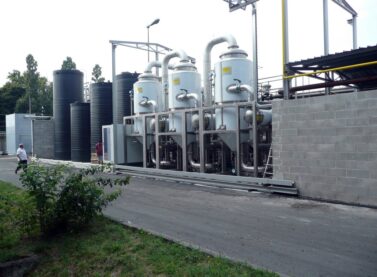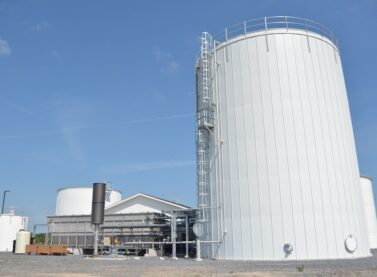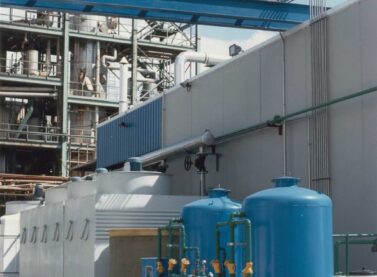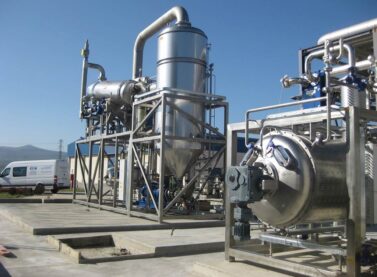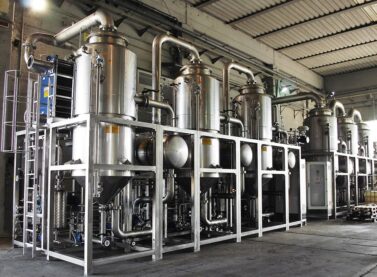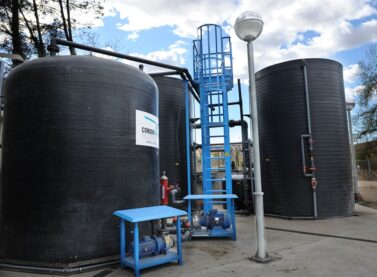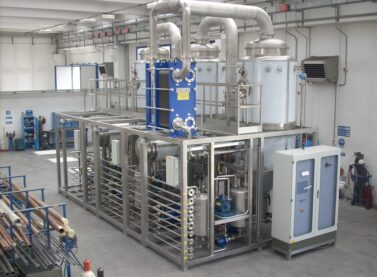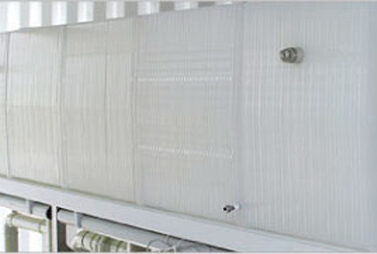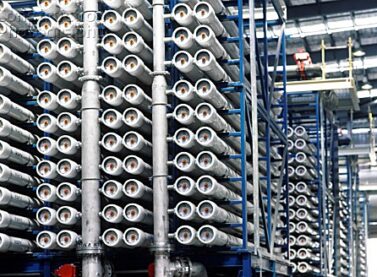Turnkey industrial wastewater treatment systems
At Condorchem Envitech we provide industrial wastewater treatment systems for the management of the effluents generated in all types of industrial activities. We have installed wastewater treatment plants for the treatment of the main pollutants that can be found in an industrial effluent, such as brines, organic matter, metals, detergents, oils, pesticides, nitrates, pesticides, phosphates, etc.
We have an extensive experience in the design, installation, start-up and maintenance of industrial wastewater treatment plants, which allows us to implement the most efficient and competitive wastewater treatment process that best suit the needs of each customer. The technologies used in every plant depend on different factors, such as the characterization of the wastewater, the sources of energy available, the operational costs, etc.
When a client submits a request to us for the treatment of their wastewater, these are the most common steps we follow:
- Wastewater characterization and study of the existing technologies for the management of the customer’s wastewater. First estimation of the required investment, operating costs and return on investment.
- Laboratory tests to analyze the results of the proposed solution and guarantee its efficiency and viability. Condorchem has more than 2,000 laboratory tests with different industrial effluents.
- Conceptual design of the most suitable treatment system using the technologies supplied by Condorchem.
- Design and execution of pilot tests on an industrial scale. If the effluent does not resemble any effluent already tested, we can verify the effectiveness and scalability of the plant with a pilot test on an industrial scale.
- Basic and detailed engineering of the treatment plant. Dimensioning of peripheral equipment, main equipment, piping design, suction ducts, pumping, storage and control architecture. We carry out turnkey projects with installation and commissioning.
- Design, manufacturing, and supply of the equipment.
- After-sales support service. Spare parts, chemical products, preventive and corrective maintenance.
Although we are experts on concentration technologies, such as vacuum evaporation and crystallization, we have carried out hundreds of projects involving other efficient technologies for industrial wastewater treatment.
Biological treatment
When the contamination is biodegradable, the removal of organic matter, nitrogen and phosphorus is feasible through this process, which is economical and efficient. Biological treatment can be aerobic or anaerobic, depending on the option of interest in each case.
Condorchem Envitech has the following treatment techniques based on biological processes:
- Active sludge: Biomass in suspension is an economical and efficient process, if space is available.
- Sequencing batch reactor (SBR): A compact and discontinuous process, notable for its versatility and flexibility.
- Membrane bioreactor (MBR): It requires little space, is highly efficient and provides high quality effluent.
- Moving bed biofilm reactor (MBBR): Notable for having a fixed biomass, obtaining a high efficiency.
- Biocarb®: A process developed by Condorchem Envitech, with a fixed biomass, for a highly efficient and competitive alternative.
- Upflow anaerobic sludge blanket (UASB) reactor: This is particularly economical with high organic loads to be treated.
- RAFAC®: An anaerobic process developed by Condorchem Envitech to treat high organic loads. A very competitive process.
Vacuum evaporation
Condorchem Envitech is very experienced with this technique, which is ideal for treating liquid industrial waste and complex mixtures.
It is a clean, compact, versatile and very effective process. If necessary, it can be used to prevent liquid discharges.
The range of vacuum evaporators are based on three different types of industrial wastewater treatment equipment, each with its own particular use:
- Heat pump vacuum evaporators
- Mechanical vapor recompression vacuum evaporators
- Multiple-effect vacuum evaporators
Membrane filtration technologies
Filtration technologies are one of the best available options for the removal of impurities out of an initial raw water source or an industrial effluent. Filtration systems capture and remove impurities as water passes through the system, producing a clean stream of water that can be discharged, reused or further treated with concentration technologies if some pollutants are still present in the effluent.
There are different types of filtration technologies for wastewater treatment, being the following the most used for effluent treatment:
- Reverse osmosis
- Ultrafiltration
- Nonofiltration
- UV light
- Ceramic filtration
Physicochemical treatment
This industrial wastewater treatment process covers a wide variety of techniques that can deal alone or combined with numerous types of contaminants (e.g. oils and fats, particles in suspension, colloidal substances, color, non-biodegradable organic matter, dissolved metals and hydrocarbons).
The most relevant single operations to remove these contaminants are the following:
- Flotation
- Decantation
- Precipitation
- Coagulation-flocculation
- Neutralization
- Adsorption
- Filtration
- Electrocoagulation
- Advanced oxidation
The proper combination of these processes and their precise sizing are the keys to the success achieved by Condorchem Envitech in the numerous projects carried out.
Our industrial wastewater treatment equipment
Industrial wastewater treatment plants
These four technologies are commonly found in an industrial wastewater treatment plant:
- Biological treatment: Biological treatment is preferred due to its low operating costs and can be used only when the pollutants are biodegradable. It may be aerobic (with oxygen) or anaerobic (absence of oxygen). Both techniques have a wide range of configurations and design options that vary the process features.
- Vacuum evaporation: This is a simple, robust and efficient way to treat liquid waste. It is one of the best technologies when water reuse and resources recovery is required, or when an effluent can't be managed with conventional technologies.
- Physical-chemical purification: Treatment based on physical-chemical processes can remove most pollutants in wastewater, either via a single operation or in combination.
- Membrane filtration is a widely used technology in wastewater treatment for separating contaminants from water. This process involves passing wastewater through semi-permeable membranes that act as physical barriers, selectively allowing water and smaller molecules to pass through while retaining larger particles, pathogens, and dissolved solids. Membrane filtration can include microfiltration, ultrafiltration, nanofiltration, and reverse osmosis, each varying in pore size and application. The technology is often used in conjunction with other treatment processes to produce high-quality effluent suitable for reuse or safe discharge into the environment.
At Condorchem Envitech, we have a deep knowledge of all these processes, which allows us to design the most efficient and cost-effective wastewater treatment systems in every scenario.
Why is industrial wastewater treatment important
Industrial wastewater is generated as a consequence of industrial activities. There is a wide range of types of industrial wastewater (e.g. from processes, cleaning and cooling), with different types of pollutants.
Most industrial processes use water in one way or another. Once used, the water has to be managed before being disposed of, regardless of whether it is returned to the natural environment or into the sewage network.
Industrial wastewater can be managed until the discharge limits set by the local regulations are met, or it can be reused.
For the former, the treatment must be sufficient so that the discharge has no detrimental environmental impact; and, if discharged into the sewage network, the wastewater physical and chemical properties must comply with current regulations. There is a third option for already treated industrial wastewater: re-use.
Since water is a natural resource that should not be wasted, the most sustainable alternative is to treat wastewater until its quality is appropriate for re-use in the process. Environmental regulations, which are increasingly demanding, mean that re-use is the most competitive option in many cases.
At Condorchem Envitech, we work to optimize the use of water in industry, promoting its re-use after the production processes via zero discharge technologies, provided that these are economically and environmentally viable.
If zero discharge is not possible, we treat it until it is within the legally established discharge limits to avoid sanctions or other serious financial or social repercussions and loss of image.
In addition to allowing compliance with current environmental legislation, the treatment of industrial wastewater offers great added value for those responsible companies sensitive to the environment.
Industrial wastewater types
Industrial wastewater can have a wide variety of physical and chemical properties depending largely on the industrial processes producing them.
Industrial wastewater can be classified into the following main types:
- Water with biodegradable organic matter
- Water with non-biodegradable organic matter
- Water with oils and fats
- Water with heavy metals
- Salt water or brines
- Liquid industrial waste
Sectors and applications
The treatment of industrial wastewater is necessary in all activities producing it, and is across most sectors.
Below is a description of the most relevant sectors producing industrial wastewater or liquid waste, the processes producing it and the most effective techniques in each case:
- Food industry: Numerous production processes generate wastewater within the food industry, e.g. slaughterhouses, salting and preserving fish, drying ham and sausages, olives and pickles, fruit juice, potato snacks, vegetable and fruit preserves, dairy products and derivatives, wine and cava producers, oils, fats and derivatives and beverage preparation, among many others.The water from these processes generally has a high content of biodegradable matter and salts. This means that normally the most competitive applications for wastewater treatment in food industry are biological processes and vacuum evaporation.
- Energy generation: Effluents are produced in desulfurization processes and purges of borated waters and that from turbines, among others. The most indicated treatments are those of a physical-chemical nature.
- Waste management: The most typical effluents from waste management plants are acidic, alkaline, contain oils and fats and used solvents and brine, among others. The most effective treatment options are physical-chemical purification and vacuum evaporation.
- Municipal solid waste dumps: Municipal solid waste landfill sites produce leachates of very complex composition which are treated by vacuum evaporation to form water and a solid waste.
- Chemical and pharmaceutical industry: The chemical industry is notable for producing very different wastewater, due to the variety of chemical processes used (basic chemical products, dyes and pigments, fertilizers, pesticides and agrochemicals, paints, varnishes and coatings, pharmaceutical products, cosmetic products and perfumes, essential oils and soaps, detergents and cleaning products, among many others).For the purification of this wide variety of wastewater, practically all available treatments are required, depending on the type of water; with some being more competitive than others, but in the end all are optimal in some cases.
- Textile industry: Textile industry wastewater contains organic matter, suspended solids and color. The things that we have to keep in mind with textile industry wastewater treatment is, depending on the textile process, the wastewater may contain high levels of pollutants.
- Energy production plants and the oil and gas sector: The main wastewater generated in this sector are drilling fluids, brine, flotation and concentration water and effluents from gas scrubbers.
- Metal and surface treatment industry: The metal and surface treatment industry generates a wide variety of industrial wastewater The most common are oily emulsions, exhausted paint pretreatment baths, exhausted electroplating and surface treatment baths, non-destructive water test samples of penetrating, wash and degreasing line liquids, compressor purges, liquid paint booth water and cleaning solvents.
- Glass and ceramics industry: Washing water from manufacturing reactors, brine and brackish waters is frequent in this industry.
